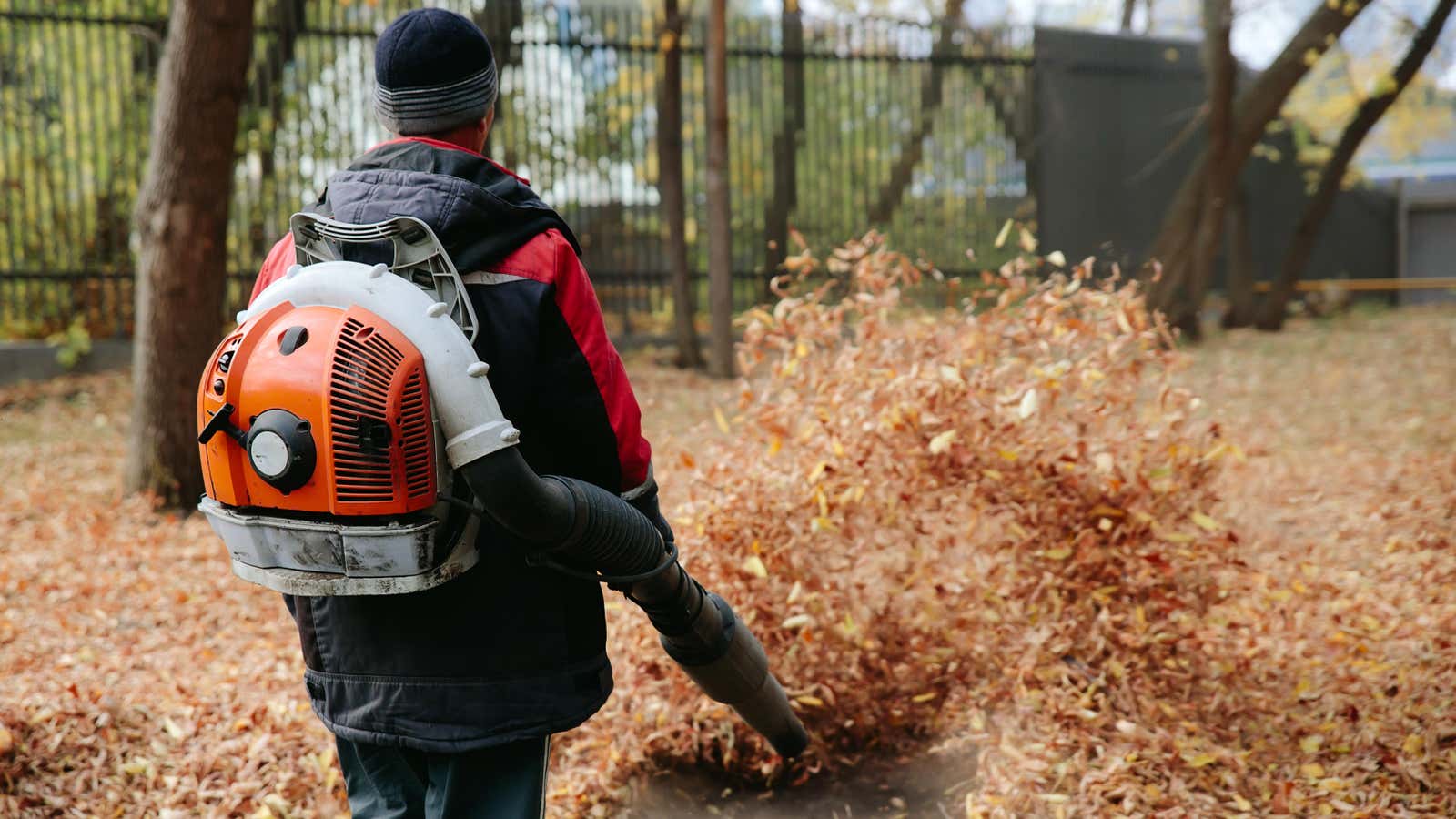Four Alternatives to Gasoline Blowers (It’s Not a Rake)

Everyone hates blowers and it’s not hard to see why. For most people, the noise is enough; if your area has lawns, chainsaw-level humming is inevitable for most of the year, and it always seems to start at the most inopportune times. But the biggest, best, and most correct reason to hate blowers is how bad they are for everyone around you. Their engines are so inefficient and pollute the environment so well that they should be classified as a public health hazard.
A gasoline-powered leaf blower is an old-school two-stroke engine with a nozzle attached. I mean literally “old school” here: unlike car engines, the ones that power blowers, chainsaws and generators look and work basically the same as they did over a hundred years ago. They still require a mixture of oil and gas, the former of which burns up in a large cloud of smoke every time the engine is started. To make matters worse, two-stroke engines do not have catalytic converters to reduce emissions. An oft-cited (and misquoted) Swedish study from 2001 found that running a lawn mower without a catalytic converter for an hour produced about the same amount of polluting emissions as driving a car for 140 km. (If you’ve heard that running a blower for an hour is worse than driving a car for 100 miles, that’s where the statistic comes from.) Most lawn mowers don’t use two-stroke engines, so you can’t really apply the results of this study to leaf blowers, but given that they are even less efficient (and less adjustable) than lawn mowers, this certainly paints a picture.
The bottom line is that huge clouds of toxic fumes are only part of the work of blowers powered by gas and oil. It is incredibly dangerous for anyone who is forced to breathe these fumes, especially for children, the elderly and, above all, for workers whose bosses and/or clients require them to operate these unpleasant devices at very close range and often without sufficient protective equipment. . Quite frankly, they should be banned and replaced with any of the following options, none of which require a rake to collect.
Electric blowers (and vacuum cleaners)
The most obvious replacement for a gasoline blower is an electric one. They are still noisy like everyone else, but powerful enough for your leaf removal needs. Electric leaf blowers are also surprisingly affordable, with lightweight models costing less than $100, while a more powerful and serious machine will set you back around $200-$400. If you want to shred those leaves for mulch, look for a blower with a vacuum and shred or mulch function; many models can do all of this.
Towing sweepers
Removing leaves and other debris from a lawn large enough to require a ride-on mower is a massive undertaking. If that describes your situation, a towing sweeper might be just what you need. These attachments attach to your lawnmower with a hitch and pick up whatever you pass. You will need to empty the collection vessel as you go, but this is certainly better than having to deal with clouds of oily smoke.
Push leaf pickers
If you want to ditch the engine entirely, you still have at least one non-rake option: push-driven leaf pickers. They are also sometimes called street sweepers, but unlike the ones that attach to a tractor or mower, you operate them much the same as a push mower. It is essentially a large basket on wheels; when you push them across the lawn, the sweeper collects leaves and other debris into a basket.
killing your lawn
Lawns are a water-demanding and water-requiring waste of space . If you redesign your yard to completely remove bare grass (or at least minimize the amount of grass that’s under falling trees), you won’t have to spend half your fall weekend picking leaves from it. In addition, fallen leaves make an excellent mulch; if your yard is set up so they fall on plants rather than grass, you can just leave them where they are and let nature take its course. Of course, this won’t help if you already have a huge pile of leaves, but it’s worth considering for the future.